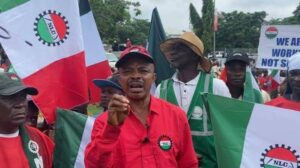See Price Labour make Demand for Fuel to be Reverted to, Amidst Controversy
See Price Labour make Demand for Fuel to be Reverted to, Amidst Controversy

NLC
Amid growing public frustration over recent fuel price increases, the Nigeria Labour Congress (NLC) has demanded that the federal government revert the price of petrol to its previous rate of ₦617. The NLC’s call comes in response to what they view as a breach of agreement by the government, which they believe had committed to maintaining fuel prices during wage negotiations.
Kola Ologbondiyan, a former National Publicity Secretary of the Peoples Democratic Party (PDP), voiced support for this demand. He argued that Umar Damagun, the acting National Chairman of the PDP, should step down to resolve the ongoing internal party crisis. Ologbondiyan suggested that Damagun’s resignation would allow for necessary reforms and restore stability within the party.
The fuel price hike occurred just as the Dangote Group prepared to release its refined products. Retailers increased the price of Premium Motor Spirit (PMS) to between ₦950 and ₦1,400, leading to widespread confusion and extended fuel shortages. The NNPC and regulatory bodies have not provided adequate explanations, leaving many Nigerians struggling with high prices and fuel scarcity.
The NLC’s spokesperson, Benson Upah, criticized the federal government for reneging on promises made during negotiations for a wage increase, which allegedly included assurances about fuel price stability. Upah described the recent price hike as a betrayal of this agreement.
The Presidential Assistant on Print Media, Abdulaziz Abdulaziz, countered these claims, asserting that no such agreement was made and accusing the NLC of playing politics with the issue.
Furthermore, the exclusive directive that only NNPC will purchase Dangote’s refined products has raised concerns among independent marketers, leading to uncertainty about the final retail prices and availability.
Despite the government’s plans to grant the Dangote refinery authority over pricing, the company has stated it cannot influence petrol prices, which remain under the control of regulatory authorities. The Minister of State for Petroleum Resources, Heineken Lokpobiri, emphasized the government’s focus on ensuring product availability rather than controlling prices.
Industry experts call for a free and competitive market to stabilize the sector and lower prices, highlighting the need for full deregulation to foster competition and improve market conditions.
As discussions and disputes continue, the resolution of the fuel price crisis remains uncertain, with ongoing debates about the implications of recent policy changes.
TRENDING SONGS
 Shock in Anambra: Bride Disappears Moments Before Wedding
Shock in Anambra: Bride Disappears Moments Before Wedding
 Nigerian Woman Returns ₦330 Million Accidentally Credited to Her Account
Nigerian Woman Returns ₦330 Million Accidentally Credited to Her Account
 APC Don Reach Morocco?’ VeryDarkMan Reacts to Seyi Tinubu Poster
APC Don Reach Morocco?’ VeryDarkMan Reacts to Seyi Tinubu Poster
 Bride Breaks Down in Tears as Wedding Meals Were Kept Secretly While Guests Go Home Hungry
Bride Breaks Down in Tears as Wedding Meals Were Kept Secretly While Guests Go Home Hungry
 Odogwu by Day, Robber by Night: How Marriage Joy Turned Into Tragedy
Odogwu by Day, Robber by Night: How Marriage Joy Turned Into Tragedy
 Nigerian Officials Allegedly Pocket N4–6B Weekly Through Smuggling Cartels at Seme–Badagry Border
Nigerian Officials Allegedly Pocket N4–6B Weekly Through Smuggling Cartels at Seme–Badagry Border
 Ahmad Yerima: Naval Officer to Face No Sanctions After Clash with Wike – Matawalle
Ahmad Yerima: Naval Officer to Face No Sanctions After Clash with Wike – Matawalle
 Trending Video: Muslim Man Joins Wife in Hallelujah Challenge ‘Dress Like Your Miracle’ Night
Trending Video: Muslim Man Joins Wife in Hallelujah Challenge ‘Dress Like Your Miracle’ Night
 Woman Seeks Advice as Late Brother’s Wife Refuses to Mourn Him Following His Death With Alleged Mistress
Woman Seeks Advice as Late Brother’s Wife Refuses to Mourn Him Following His Death With Alleged Mistress
 Nobody Cares About Fine Girls In The UK, I Miss Nigeria — Nigerian Lady Laments
Nobody Cares About Fine Girls In The UK, I Miss Nigeria — Nigerian Lady Laments
Share this post with your friends on ![]()













